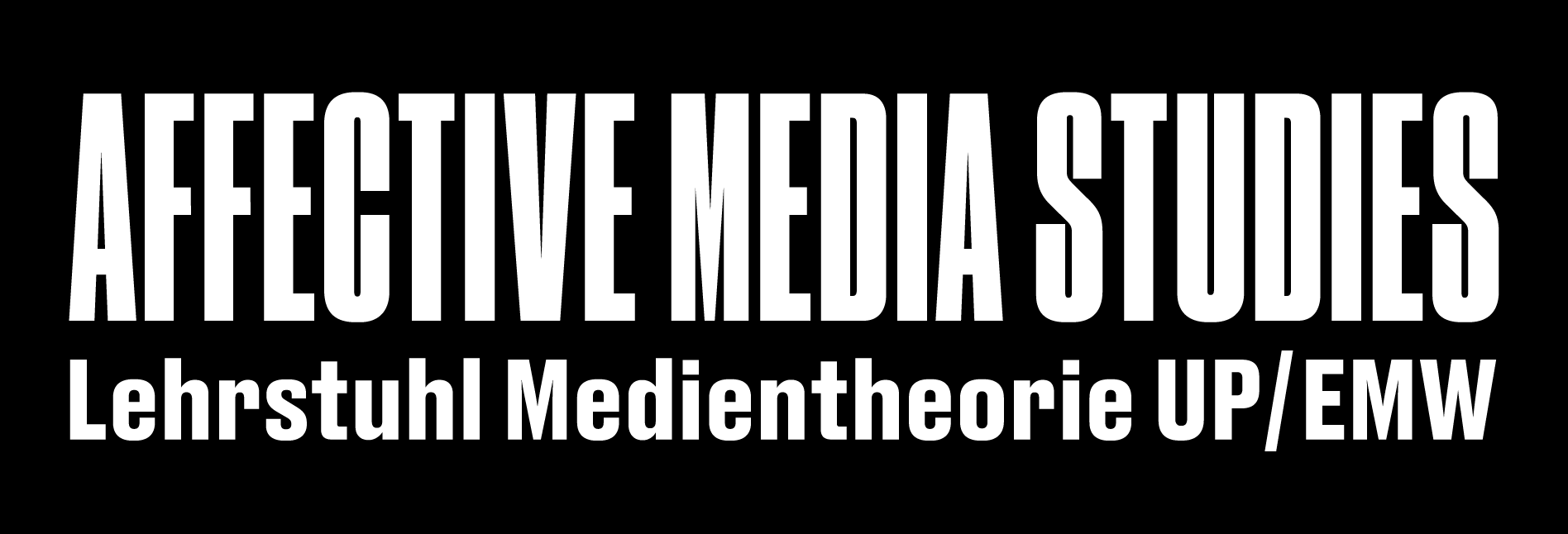back
Control: Media Technologies and the Modulations of Affect
February 23, – 24, 2017
Event — Semi public Workshop of DFG-Netzwerks »Affect- and Psychotechnology Studies«. The current media-technological condition is characterized by growing and radically distributed networked processing powers. This workshop aims to encourage a critical investigation and reinvention of our epistemological tools and — in general — theoretical concepts in light of challenging new trajectories imposed by the ubiquity of data probing, sensing, processing and distribution.
Specifically the constellation of big data and algorithms in diverse societal fields as a new paradigm of science and governance, ranging from social media to warfare, asks for a shift in concepts. What we witness are (amongst others) (1) a further blurring between state actors and private companies, making it impossible to distinguish between the economy and the state, (2) the advent of a neopositivism that believes in data as a new regime of truths accompanied by a shift from causation to correlation in the production of its truth, and (3) the proliferation of affect as a key trajectory of governance in political discourses as in public relations alike.
The proliferation of affect as a resource for governance via networked processing powers puts signification in crisis and inscribes a new rationale into 21st century cultures. Affect seems to be partially redefined in relation to its processability and modulation in distributed digital environments, e.g. with the means of sentiment analysis, as a new paradigm of science and
governance.
Our workshops aims at a better understanding of such changes in the logic of governmentality and control. What are new modes of knowledge, decision and power that may redefine a new episteme of the 21th century? This implies questions about new modes of subjectivation and collective enunciations to cope with the fast changes that a digitally performing capitalism poses and the
imposition of new temporal regimes originating from digital infrastructures.
We specifically want to discuss:
— How can we conceptualize affect as part of a contemporary biopower?
— What concepts exist to reintroduce critical thinking and practice into this new paradigm that more
and more neglects signification?
— How are modulations of control (re-)conceptualized between distributed networks and ongoing reterritorializations
of algorithmic power?
— What is the horizon of this 21st century episteme? What are its imaginaries?
Guests: Louise Amoore (Durham University), Katrin Kämpf (Humboldt Universität)
Louise Amoore
»Cloud Control«
The algorithmic architecture of cloud computing is becoming ever more closely intertwined with sovereign authority — from the sharing of intelligence data, to border controls, immigration decisions, and drone strikes. Developing an analogy with the aesthetics and affects of the cloud chamber of early twentieth century particle physics, I explore the geopolitical capacities of the cloud in cloud computing. How does the cloud render perceptible that which could never be visible on a register of human vision? Like the cloud chambers of twentieth century particle physics, contemporary cloud computing is concerned with rendering perceptible and actionable that which would otherwise be beyond the threshold of knowable futures. Through the computational logics of feedback loops and back propagation, the global present becomes governed and controlled by cloud reasoning on three distinct registers: condensing traces; discovering patterns; and archiving the future.
Katrin Kämpf
»›Connect with friends and loved ones during a disaster‹ —
Facebook’s safety check and the premediation of terror«
Facebook’s safety check is marketed as a way to connect with »friends« in times of disaster and at first glance, the one-click way of signaling wellbeing might look like a practical tool for times when internet access is irregular or phone networks are overloaded. At a closer look, though, it can also be interpreted as premediation of terrorism and in its current implementation as a way to turn care itself into a form of terror.
SCHEDULE (semi public)
Thursday, February 23
| 14:00 –14:30 | Welcome & Introduction of our Guests |
| 14:30 – 16:00 | Input: »Control: Media Technologies and the Modulations of Affect« (O. Leistert, J. Weber, S. Wiemer) |
| 16:00 –16:30 | Coffee Break |
| 16:30 – 17:30 | Discussion of two Texts: John Cheney-Lippold »A New Algorithmic Identity: Soft Biopolitics and the Modulation of Control«; Jeremy Crampton »Assemblage of the Vertical: Commercial Drones and Algorithmic Life« |
| 18:00 –20:00 | Public Evening Lecture by Louise Amoore »Cloud Control« |
Friday, February 24
| 10:00 –12:00 | Lecture/Input: Katrin Kämpf »›Connect with Friends and Loved Ones During a Disaster‹ – Facebook’s Safety Check and the Premediation of Terror« |
| 12:00 – 13:00 | Wrap-Up & Closing Remarks |
Location:
Jenny Aloni-Haus, University of Paderborn
Conception:
Oliver Leistert, Jutta Weber, and Serjoscha Wiemer
